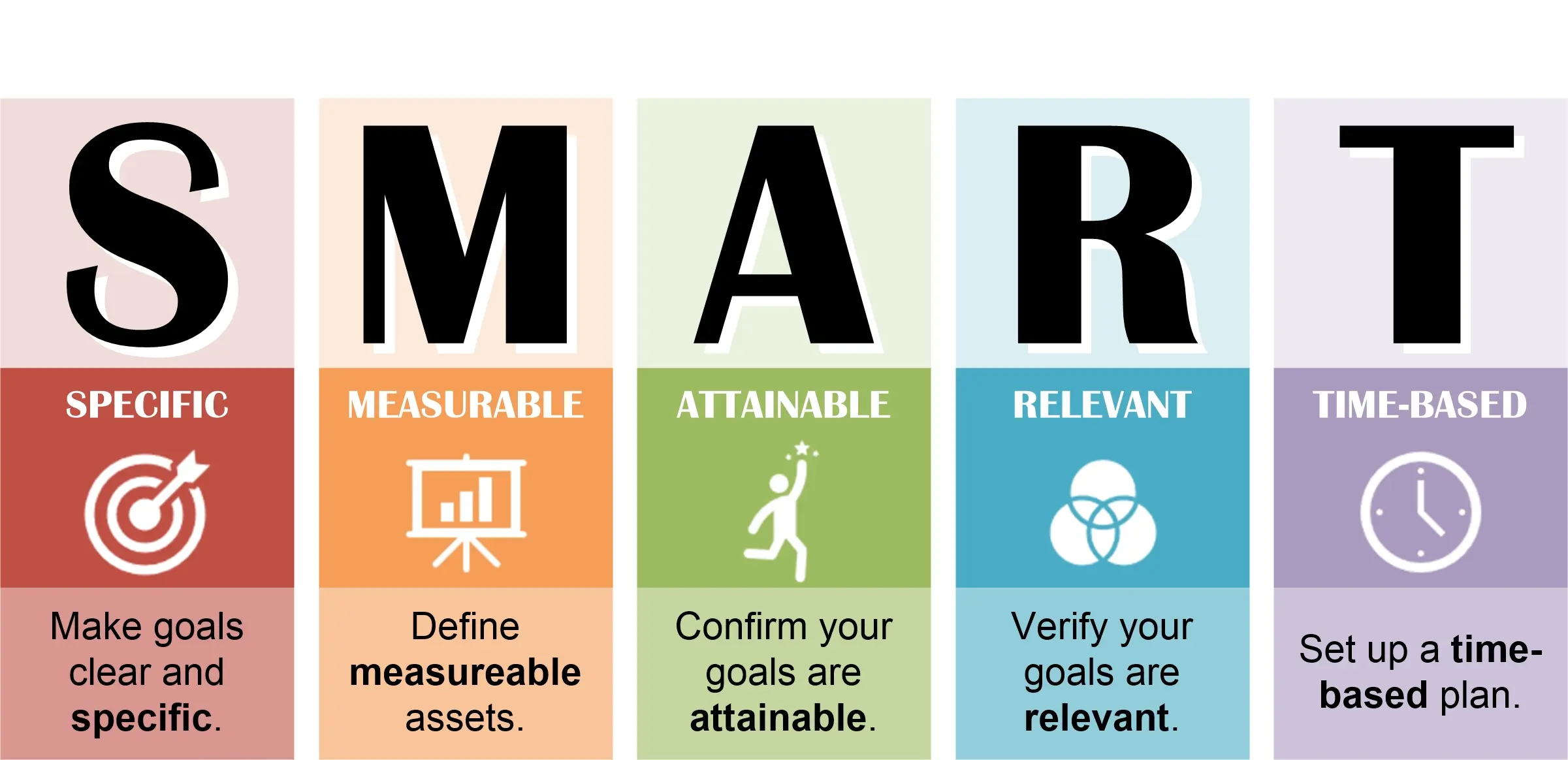Fast & Effective Goal Achievement Steps

Key Takeaways
- Goals are essential for personal growth, providing direction and motivation.
- SMART goals are Specific, Measurable, Achievable, Relevant, and Time-bound.
- Common challenges in achieving goals include lack of clarity and unrealistic expectations.
- Breaking goals into actionable steps and setting realistic deadlines increases success.
- Visualizing success can boost motivation and focus.

Quick Introduction to Goal Setting
Setting goals is like charting a course for a journey. Without a clear destination, you might wander aimlessly, never reaching your desired outcome. Goals give us purpose and direction, and most importantly, they help us measure progress. Whether you're aiming to improve your grades, learn a new skill, or run a marathon, setting clear goals is the first step toward success.
Think of goal setting as a way to unlock your potential. It’s not just about writing down what you want to achieve; it’s about creating a roadmap to get there. This roadmap guides you, keeps you focused, and helps you overcome obstacles along the way.
- Define what you want to achieve.
- Create a plan with specific steps.
- Stay motivated and adaptable.
- Track your progress regularly.
- Celebrate your achievements.
Why Goals Matter for Personal Growth
Goals are crucial for personal growth because they push us to expand our limits and achieve more than we thought possible. They serve as a benchmark for success and provide motivation to keep moving forward, even when the going gets tough. By setting and achieving goals, you develop new skills, gain confidence, and build resilience.
Moreover, goals help prioritize what’s important. In a world full of distractions, having clear goals allows you to focus on what truly matters. It’s easy to get caught up in the noise, but goals act as a filter, helping you concentrate your energy on meaningful activities.
Common Challenges in Achieving Goals
Despite the benefits, many people struggle to achieve their goals. One common challenge is setting goals that are too vague or unrealistic. Without clarity, it’s hard to know where to start or how to measure progress. Additionally, some people set goals based on what they think they should do, rather than what they truly want, leading to a lack of motivation.
Another obstacle is not breaking down goals into manageable steps. Large goals can seem overwhelming, making it difficult to take action. Procrastination and fear of failure can also hinder progress, as can a lack of resources or support.

Smart Goal Setting Techniques
To overcome these challenges, it’s essential to use effective goal-setting techniques. One of the most popular methods is the SMART criteria, which stands for Specific, Measurable, Achievable, Relevant, and Time-bound. This framework ensures that your goals are clear and realistic, increasing the likelihood of success.
Understanding the SMART Criteria
Each component of the SMART criteria plays a vital role in effective goal setting:
- Specific: Clearly define what you want to achieve. Avoid vague statements like "get fit" and opt for specifics like "run 5 kilometers three times a week."
- Measurable: Establish criteria for measuring progress. This could be tracking the number of pages you read each week or the amount of money saved.
- Achievable: Set goals that are challenging yet attainable. Consider your current skills and resources to ensure your goal is realistic.
- Relevant: Ensure your goals align with your values and long-term objectives. They should be meaningful and worthwhile.
- Time-bound: Set a deadline to create a sense of urgency. This helps prevent procrastination and keeps you on track.
Examples of SMART Goals
Let's take a look at some examples to illustrate the SMART criteria in action:
Example 1: "I will save $500 for a new bike by setting aside $50 from my weekly allowance over the next 10 weeks."
Example 2: "I will improve my math grade by studying for 30 minutes each day and attending a weekly tutoring session, aiming to achieve a B+ by the end of the semester."
Effective Strategies to Achieve Quickly
Setting SMART goals is just the beginning. To achieve them quickly and efficiently, you need effective strategies that keep you motivated and on track. Here are some tried-and-true methods:
- Visualize your success and imagine how achieving your goal will make you feel.
- Stay flexible and be willing to adjust your plan as needed.
- Seek feedback and support from others who can help you stay accountable.
- Celebrate small victories to maintain motivation and momentum.
Breaking Down Goals into Actionable Steps
One of the most effective ways to achieve your goals is by breaking them down into smaller, actionable steps. This makes large goals feel less daunting and provides a clear path forward. Start by identifying the major milestones you need to reach along the way. Then, break these milestones into even smaller tasks that you can tackle one at a time.
Setting Realistic Deadlines and Milestones
Setting realistic deadlines and milestones is crucial for maintaining momentum. When setting deadlines, consider your current commitments and resources. It’s better to set a slightly longer timeline and achieve your goal without stress than to rush and risk burnout.
Visualizing Success for Motivation
Visualization is a powerful tool that can significantly boost your motivation. By imagining yourself achieving your goals, you create a mental picture of success that encourages you to keep going. This mental rehearsal prepares your brain for the real thing, increasing your chances of success. Take a few minutes each day to close your eyes and picture yourself accomplishing your goals. Imagine the details: the sights, sounds, and feelings associated with your achievement. This practice not only motivates you but also clarifies your vision, making your goals feel more tangible and attainable.
Overcoming Obstacles
Every journey towards a goal comes with its share of obstacles. Recognizing and addressing these challenges head-on is crucial for success. Whether it's a lack of time, resources, or motivation, identifying the barriers that stand in your way allows you to develop strategies to overcome them. Remember, obstacles are not roadblocks; they are opportunities to learn and grow stronger.
Identifying Personal Barriers
Start by taking a closer look at what’s holding you back. Are you procrastinating because the task seems too big? Are you doubting your abilities or lacking confidence? Identifying these personal barriers is the first step in overcoming them. Keep a journal where you note down the challenges you face and reflect on the reasons behind them. This awareness will help you devise practical solutions.
Creating Solutions for Common Challenges
- Lack of Time: Break your goals into smaller tasks and schedule them into your daily routine. Prioritize tasks and eliminate time-wasting activities.
- Lack of Resources: Identify what you need and look for creative ways to acquire it. This could mean borrowing equipment, finding free resources online, or collaborating with others.
- Fear of Failure: Reframe failure as a learning opportunity. Understand that setbacks are part of the process and use them to improve and refine your approach.
Once you've identified your challenges, brainstorm solutions. For instance, if you struggle with time management, consider using a planner to organize your tasks. If motivation is an issue, find an accountability partner who can help keep you on track. Tailor your solutions to fit your unique situation and needs.
It's also helpful to anticipate potential obstacles before they arise. This proactive approach allows you to prepare strategies in advance, reducing the impact of any setbacks. For example, if you know you'll face a busy period at work, plan to adjust your schedule accordingly to maintain your progress.

Building a Support System
"Surround yourself with people who believe in your dreams, encourage your ideas, support your ambitions, and bring out the best in you." - Roy T. Bennett
A strong support system can make all the difference when pursuing your goals. Surround yourself with people who encourage and inspire you. These can be friends, family members, mentors, or colleagues who share your vision and are willing to offer guidance and support. A supportive network not only provides motivation but also offers different perspectives and advice when you face challenges.
Consider joining a group or community related to your goal. Whether it's an online forum or a local club, connecting with like-minded individuals can provide valuable insights and encouragement. Sharing your progress and setbacks with others creates a sense of accountability and camaraderie.
Remember, asking for help is not a sign of weakness. It shows your commitment to achieving your goals and your willingness to learn from others. Don't hesitate to reach out to your support system when you need advice, feedback, or a motivational boost.
Implementing and Monitoring Progress
Once you have a clear plan and support system in place, it's time to implement your strategies and monitor your progress. This stage is all about taking action and making consistent efforts toward your goals. Regularly assessing your progress helps you stay on track and make necessary adjustments to your approach.
Time Management Tips
Effective time management is crucial for achieving your goals. Start by setting priorities and focusing on the most important tasks first. Use tools like calendars and to-do lists to organize your schedule and allocate specific time slots for each task. Avoid multitasking, as it can reduce efficiency and increase errors. Instead, concentrate on one task at a time, completing it before moving on to the next.
Tools for Tracking Goal Progress
There are numerous tools available to help you track your progress and stay organized. Consider using apps or software designed for goal setting, such as Trello, Asana, or Google Keep. These tools allow you to create task lists, set deadlines, and monitor your achievements. Keeping a journal or logbook is another effective way to track your progress and reflect on your journey. For more insights, check out these goal setting techniques.
Adjusting Plans as Needed
Flexibility is key to successful goal achievement. Be open to adjusting your plans if you encounter unexpected obstacles or if your priorities change. Regularly review your progress and assess whether your current strategies are working. If not, don't be afraid to pivot and try a different approach. Remember, the path to success is rarely a straight line, and adapting to changes is an essential part of the process.

Final Insights for Goal Achievers
Achieving your goals is a journey that requires dedication, flexibility, and resilience. Remember, the path may not always be straightforward, but each step you take brings you closer to your dreams. Embrace the process and stay committed to your vision.
Embrace Flexibility and Adaptability
Life is unpredictable, and your plans may need to change along the way. Embrace flexibility and adaptability as valuable tools in your goal-achieving arsenal. When faced with challenges, reassess your approach and be open to new strategies. This adaptability not only helps you overcome obstacles but also strengthens your problem-solving skills.
The Importance of Celebrating Success
- Recognize small victories to maintain motivation.
- Reward yourself for milestones achieved.
- Reflect on your progress and learn from experiences.
- Share your achievements with your support system.
Celebrating your successes, no matter how small, is essential for staying motivated. Take the time to acknowledge your achievements and reward yourself for your hard work. This positive reinforcement fuels your drive to continue pursuing your goals.
Reflecting on your journey allows you to learn from your experiences and identify areas for improvement. Share your successes with your support system, as their encouragement and recognition can further boost your motivation.

Frequently Asked Questions
As you work towards your goals, you may encounter some common questions and challenges. Here are answers to help guide you on your journey.
How can I set a realistic timeline for my goals?
Setting a realistic timeline involves assessing your current commitments and resources. Break your goal into smaller tasks and estimate the time required for each. Consider potential obstacles and build in buffer time to accommodate unforeseen circumstances. It's better to have a slightly longer timeline and achieve your goal without stress.
What should I do if I face setbacks?
Setbacks are a natural part of the goal-achieving process. When you encounter them, take a step back and evaluate the situation. Identify the cause of the setback and brainstorm potential solutions. Adjust your plan as needed and use the experience as a learning opportunity. Remember, persistence is key to overcoming obstacles. For more guidance, consider exploring goal-setting techniques that can help you stay on track.
It's also helpful to maintain a positive mindset and remind yourself of your progress so far. Lean on your support system for encouragement and guidance during challenging times. For more strategies, explore these goal-setting techniques.
How do I maintain motivation over time?
Maintaining motivation requires consistent effort and self-reflection. Regularly revisit your goals and remind yourself of the reasons behind them. Visualize your success and the positive impact achieving your goals will have on your life. Break your goals into smaller tasks and celebrate each achievement to keep your motivation high.
Additionally, surround yourself with supportive individuals who inspire and encourage you. Their positivity and belief in your abilities can significantly boost your motivation.
Are there tools that can help me track my goals?
Consider using digital tools such as Trello, Asana, or Google Keep to organize and track your goals. These platforms offer features like task lists, deadlines, and progress tracking, making it easier to stay on top of your objectives.
These tools provide a visual representation of your progress and help you stay organized. Regularly update your progress and adjust your plans as needed to ensure you're on track to achieve your goals.
In addition to digital tools, consider keeping a journal to document your journey. Writing down your thoughts, challenges, and achievements can provide valuable insights and help you stay focused.
Why is it important to celebrate small victories?
Celebrating small victories reinforces positive behavior and boosts motivation. It acknowledges the effort you've put in and reminds you of your progress, even when the ultimate goal seems distant. These celebrations create a sense of accomplishment and encourage you to continue pushing forward.
Moreover, recognizing small victories helps build confidence and resilience. It shifts your focus from what you haven't achieved to what you have, fostering a positive mindset that propels you towards future success.
